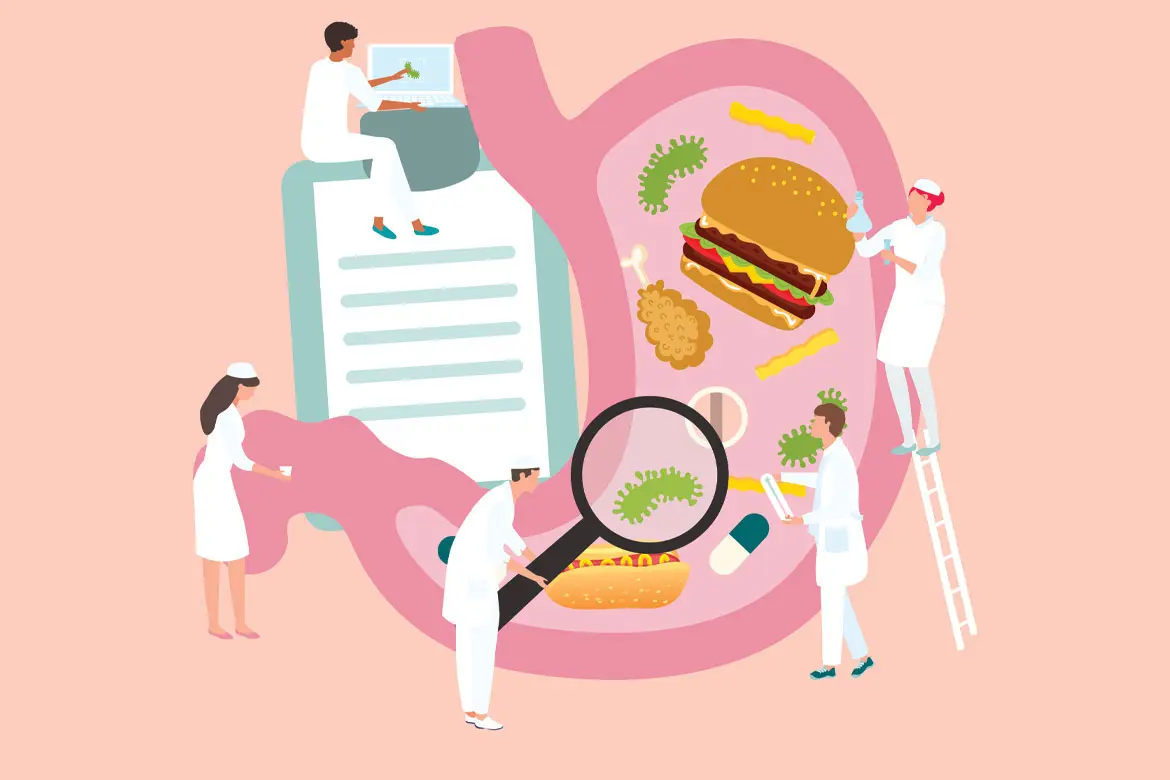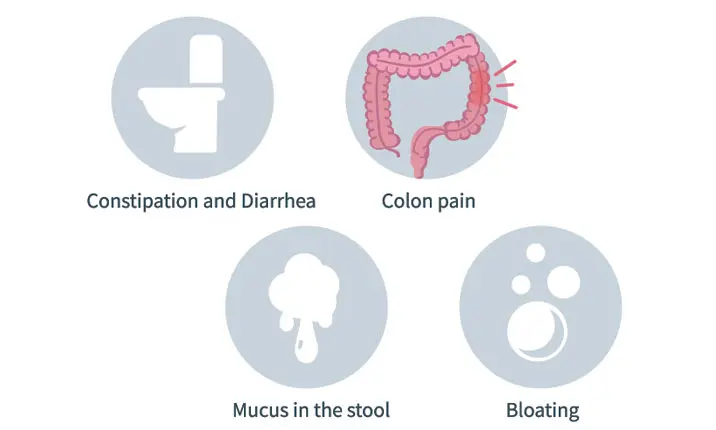Almost 1 in 10 Singaporeans suffer from irritable bowel syndrome or IBS, a disorder more commonly found in those between 20 – 30 years old. While some may experience only mild or intermittent discomfort, others experience severe symptoms that significantly disrupt their daily lives. In spite of this, some estimates indicate that up to 70% of people with IBS are not receiving treatment.
IBS is a stress-sensitive disorder, hence it can be triggered or made worse by stressful situations, such as having to adapt to monumental changes in lifestyles. This can range from job-related stress or dealing with difficult relationships, to the widespread upheaval caused by COVID-19. For those who unknowingly suffer from this condition, getting diagnosed and seeking proper treatment can help improve their quality of life.
Dr Reuben Wong, gastroenterologist at Gleneagles Hospital, gives an overview of this disorder and how to manage the condition.
What is irritable bowel syndrome (IBS)?
Irritable bowel syndrome is a condition that affects the digestive system. It is known by many names, such as spastic colon, irritable colon, mucous colitis or spastic colitis.
IBS is a lifelong condition that encompasses a range of gastrointestinal symptoms that often occur together and last for at least 3 days per month, for at least 3 months.
What causes irritable bowel syndrome (IBS)?
The precise cause of irritable bowel syndrome is unknown but there are several known factors that are associated with this condition. These include:
- Muscle contractions in the intestine, which normally help to move food through the digestive tract. Stronger contractions that last longer can cause gas, bloating and diarrhoea while weak contractions lead to slower movement and hard, dry stools.
- Nervous system, which coordinates signals between the brain and intestines. In people with IBS, poorly coordinated signals cause the body to overreact to changes in the digestive process, leading to pain, diarrhoea or constipation.
- Gastroenteritis or severe diarrhoea, caused by a virus or bacteria, can trigger IBS. Similarly, bacterial overgrowth in the intestines is also associated with IBS.
- Changes or imbalance in gut microbes, which play an important role in digestion and other functions. These microbes include beneficial bacteria, fungi and viruses, and research shows that these microbe levels are different in those with IBS.
- Stress, which causes a gastrointestinal reaction and can trigger IBS. Stress can encompass a wide range of physical factors, such as hormonal changes, strenuous activity, infection or surgery, as well as emotional or psychological stress. As there is such a direct link, this is sometimes called the brain-gut connection.
Symptoms of irritable bowel syndrome (IBS)
A person with irritable bowel syndrome may experience any of the following; for some, one symptom may be dominant.
- Abdominal pain, felt as cramping or spasms, discomfort, or a dull ache that ranges from mild to severe.
- Bloating
- Constipation, which occurs when stools are hard, dry and difficult to pass.
- Diarrhoea or loose, watery stools, which may be accompanied by abdominal cramping or the urgent need to relieve yourself.
- Excessive flatulence (passing gas), burping
- Mucus on stools
Diagnosing irritable bowel syndrome (IBS)
During the consultation with your doctor, do mention any other symptoms that you may be having, such as fatigue and insomnia, and if you see a link between your symptoms and diet or lifestyle. These may give clues on what may be causing the IBS and how much it's affecting your life.
In addition to taking note of your symptoms, your doctor may want to conduct tests to rule out other possible causes and confirm the diagnosis. These may include:
- Endoscopy to exclude cancer or celiac disease
- Breath tests to check for intestinal bacterial overgrowth or food intolerances
- Stool sample to rule out infection
- Colonoscopy to exclude colitis, Crohn's disease or cancer
Managing irritable bowel syndrome (IBS)
Although there is no cure for irritable bowel syndrome, a combination of stress management, diet and lifestyle adjustments are key to reducing the frequency and severity of symptoms. If these are inadequate to manage your symptoms, your doctor may recommend medication.
Dietary modifications and recommended foods for IBS
- Avoid foods that trigger symptoms. This may include caffeine and carbonated beverages or vegetables that cause bloating such as broccoli and cauliflower. Some may also find that deep-fried or oily foods trigger IBS symptoms.
- Consume foods that are high in fibre
- Drink plenty of fluids
- Eat smaller meals
Lifestyle changes that may help IBS
Leading a generally healthy lifestyle can help to relieve the severity of IBS symptoms and also reduce your risk for other ailments hence you should aim to:
- Exercise regularly
- Get enough sleep
Stress management for IBS
Learning to manage stress effectively is an important aspect of managing IBS. There are different techniques you can try, which include:
- Medication or yoga which encourage deep breathing and focussing your thoughts
- Journaling as an outlet for your emotions and to monitor your progress
- Participating in a support group for IBS patients, as a social network with others who understand your condition can be a source of relief and comfort
- Seeing a counsellor to help you manage stress and other psychological conditions such as depression, which may worsen symptoms of IBS
Medical treatment for IBS
If the modifications above are unable to effectively reduce the frequency and severity of your IBS symptoms, you may require medication. There are several types of medications, and your doctor will recommend one or more to help with your symptoms.
Medications that may be prescribed for IBS include:
- Fibre supplements or laxatives to help relieve constipation
- Probiotics
- Anti-diarrhoeal medication to treat diarrhoea
- Anticholinergic medication to relieve painful spasms
- Antidepressants to relieve symptoms like pain while also treating depression
- Pain medication to ease the pain of severe bloating
- Antibiotics to treat infection
- Specialised IBS medications, with different types that can help regulate muscle contractions, ease bowel movement and other symptoms
Complications of irritable bowel syndrome (IBS)
IBS does not lead to cancer but frequent recurring of symptoms can lead to poor quality of life, from:
- Frequent need to use the toilet
- Avoiding social engagements
- Missing work days
- Higher likelihood of emotional or psychological disorders such as anxiety or depression
IBS can also affect the well-being and health of the spouses and partners of IBS patients. The more severe the IBS, the worse the strain on the relationship, on multiple fronts.
When to see a doctor
If you are already seeking treatment for IBS, remember to follow your doctor's advice to manage your symptoms. If you suspect that you may be suffering from IBS, make an appointment to see a gastroenterologist as soon as the situation allows.
When to visit the UCC
If you experience prolonged abdominal pain, vomiting or diarrhoea, or there is blood in your vomit or stools, please seek immediate medical treatment at the nearest hospital's Urgent Care Centre (UCC).














